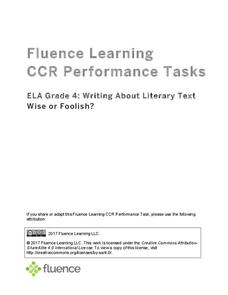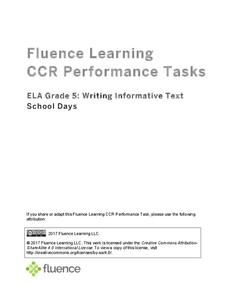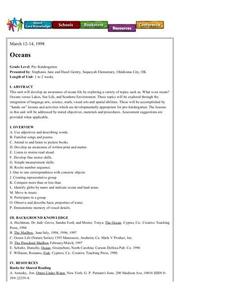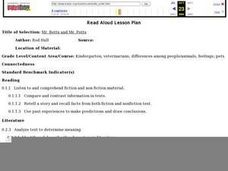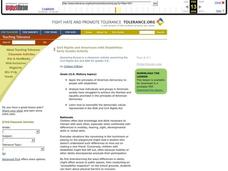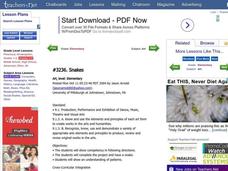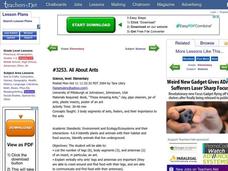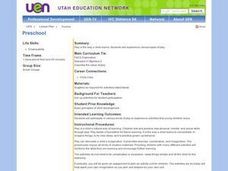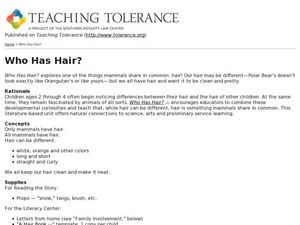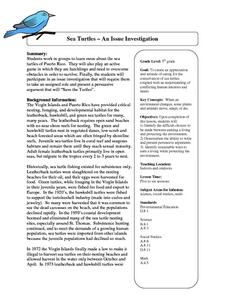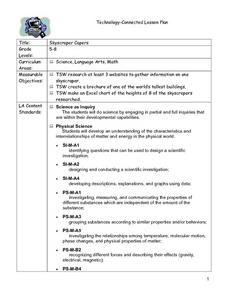Fluence Learning
Writing About Informational Text: Everybody Can Bike
A three-part assessment challenges scholars to read informational texts in order to complete three tasks. Following a brief reading, class members take part in grand conversations, complete charts, and work in small groups to research...
Fluence Learning
Writing About Literary Text: Wise or Foolish?
A three-part assessment promotes reading comprehension skills. Class members read literary texts and take notes to discuss their findings, answer comprehension questions, write summaries, and complete charts.
Fluence Learning
Writing an Opinion: Student Council
A three-part assessment challenges scholars to write opinion essays covering the topic of the student council. After reading three passages, writers complete a chart, work with peers to complete a mini-research project, answer...
Fluence Learning
Writing About Literature: Comparing and Contrasting Characters in Heidi
Scholars read excerpts from the story, Heidi, in a three-part assessment that focuses on comparing and contrasting characters. Each part contains three tasks that challenge learners to discuss, answer comprehension questions,...
Fluence Learning
Writing Informative Text: School Days
A three-part writing assessment challenges scholars to think critically about schools of the past and present. Learners read informative texts, answer questions to prepare for a discussion, research in small groups, complete a Venn...
Howard Hughes Medical Institute
Winogradsky Columns: Microbial Ecology in the Classroom
Winogradsky columns are ideal for observing the role of bacteria and other microorganisms in an ecosystem. This student activity guide is complete with data tables for observations and analysis questions for processing what was observed....
Curated OER
All About Me: My Senses
Students describe the basic senses and then use their senses to describe what they learned.
Curated OER
Home Living/Life Skills: Face Washing
Having good hygiene skills is a very important part of living an independent life. Learners with special needs follow sequencing cards to practice washing their faces. They follow each step in the process and discuss the importance of...
Curated OER
Oceans
Students become aware of the differences between ocean water and lake water by smelling, tasting and seeing. They distinguish between land and bodies of water on a globe and gain increased awareness of oceans and life.
Curated OER
"A Pig is Big"
Students explore the concept of big, bigger, and biggest. They examine and classify items by size, listen to and discuss the book "A Pig is Big," complete a fill in the blank activity, and create a tri-fold that illustrates two items...
Curated OER
"Mr. Betts and Mr. Potts"
First graders listen to the book "Mr. Betts and Mr. Potts" and examine the career of being a veterinarian. They categorize animals based on whether they could be house pets or not, develop a class pet graph, and list the various...
Curated OER
The Acoustics House
Students study how drums produce sound by building and playing a simple drum. They measure the diameter of their can, then mark a circle two inches larger in diameter on their piece of plastic with the marker or chalk, and cut out the...
Curated OER
All About Me: My Senses
Students explore the world around them and identify their five senses and the parts of their bodies that are associated with each sense.
Curated OER
Civil Rights and Americans with Disabilities
Students apply the principles of American democracy to people with disabilities. They analyze how individuals and groups in American society have struggled to achieve the liberties and equality promised in the principles of American...
Curated OER
Snakes
Students follow directions to make a snake out of patterns. They research a specific snake and present it to the class in a group. They listen to a presentation about the King Cobra snake prepared by the teacher.
Curated OER
All About Ants
Students create model ants in order to study the characteristics of insects such as body segments, number of legs, and feelers, as well as how these characteristics serve the insect.
Curated OER
Preschool
Pupils experience various types of play. They determine play is the way a child learns and describe the value of play. They discover that play is a child's natural way of learning and that children test and practice new physical,...
Curated OER
Who Has Hair?
Students explore similarities and differences. In this Teaching Tolerance instructional activity, students read literature and participate in activities that features mammals and their hair. Students learn that they share things in...
Curated OER
Sea Turtles: An Issue Investigation
Fifth graders explore sea turtles and the issues relating to them as endangered species. They research sea turtles on the Internet and find reasons why the turtles are endangered. They identify potential issues to be considered when...
Curated OER
Using an Old Brush in a New Way
Students use toothbrushes, scissors, tag board paper, pencils, drawing paper, tempera, water color kits, and water. They draw a simple contour shape on tag board and cut it out in one piece. Students identify the positive and negative...
Curated OER
Skyscraper Capers
Students discuss skyscrapers and listen as the teacher introduces the project. They use the Internet to perform research on one skyscraper. Students use information they gather to create a brochure of their building . They create an...



